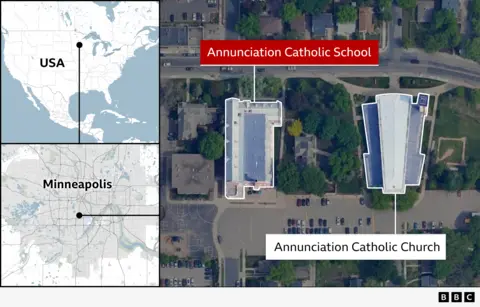In a move that has left many Kenyans divided, President William Ruto declared plans to construct an 8,000-seat church at State House in Nairobi, asserting he will finance the project personally and insists he owes no one an apology for it. "The devil might be angry and can do what he wants," he remarked, a statement that reflects his unwavering stance in the face of public criticism. This declaration, made earlier this month, fueled anger among citizens who are already wary of perceived intertwining of politics and religious institutions in the country.
Reports indicate the church will feature stained glass windows and an architectural design that some have argued conflicts with Kenya's secular constitution. Critics have also raised concerns about the funding, with estimates placing the project’s cost at approximately $9 million (£6.5 million), while many citizens are grappling with the escalating cost of living.
Ruto countered the financial criticisms by stating he would cover the costs personally, leading some to question the appropriateness of erecting such a building on government property. An MP even issued an open letter emphasizing Kenya's pluralistic society and the need for respect for all religions, which include a significant Muslim minority, as well as adherents of Hinduism and traditional African spiritual beliefs.
"I found a church but one made out of iron sheets. Does that look befitting for the State House?" Ruto defended his decision to upgrade the existing structure during a meeting with political allies, highlighting his identity as Kenya’s first evangelical Christian president, a persona he has carefully cultivated throughout his political career.
While over 85% of Kenyans identify as Christian, the absence of other religious structures within the presidential confines—such as a mosque for the Muslim community—has raised further questions about inclusivity and respect for diverse faiths. As public discourse continues regarding Ruto's motivations and the wider implications of this project, it seems clear that this church will not only symbolize his beliefs but also potentially deepen the rifts within Kenyan society.
Reports indicate the church will feature stained glass windows and an architectural design that some have argued conflicts with Kenya's secular constitution. Critics have also raised concerns about the funding, with estimates placing the project’s cost at approximately $9 million (£6.5 million), while many citizens are grappling with the escalating cost of living.
Ruto countered the financial criticisms by stating he would cover the costs personally, leading some to question the appropriateness of erecting such a building on government property. An MP even issued an open letter emphasizing Kenya's pluralistic society and the need for respect for all religions, which include a significant Muslim minority, as well as adherents of Hinduism and traditional African spiritual beliefs.
"I found a church but one made out of iron sheets. Does that look befitting for the State House?" Ruto defended his decision to upgrade the existing structure during a meeting with political allies, highlighting his identity as Kenya’s first evangelical Christian president, a persona he has carefully cultivated throughout his political career.
While over 85% of Kenyans identify as Christian, the absence of other religious structures within the presidential confines—such as a mosque for the Muslim community—has raised further questions about inclusivity and respect for diverse faiths. As public discourse continues regarding Ruto's motivations and the wider implications of this project, it seems clear that this church will not only symbolize his beliefs but also potentially deepen the rifts within Kenyan society.

















